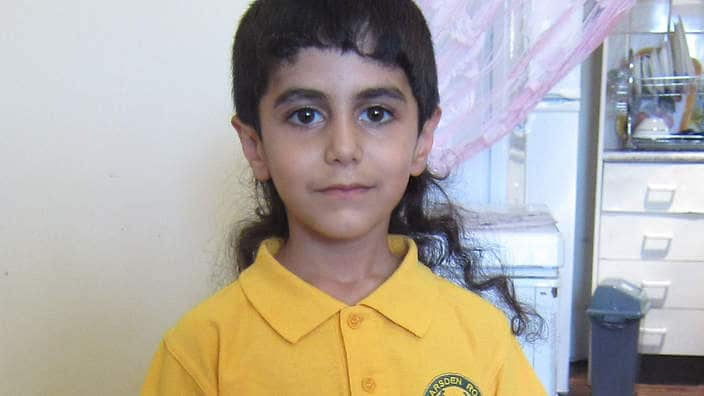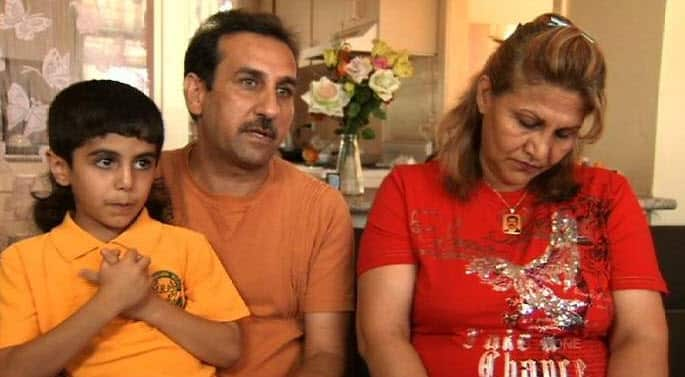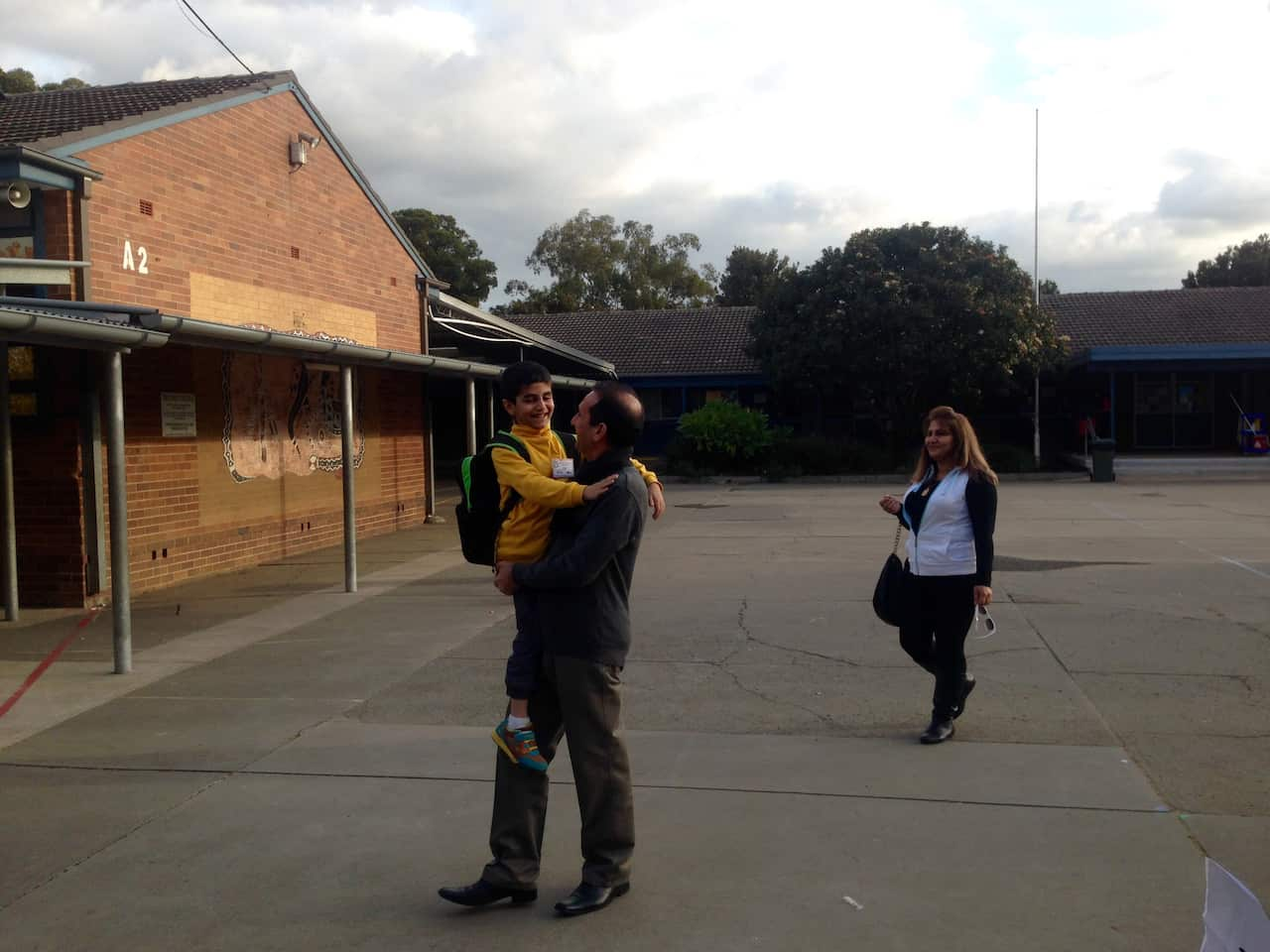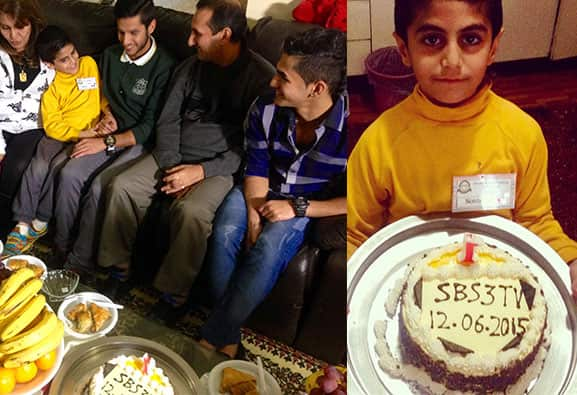The first thing I noticed about Noran was his hair. Closely cropped on the top and sides, it billowed out like a fan at the back, dark coils stretching down over his shoulder blades. His mum Ebtisam laughed as I admired it. He refused to cut it, she said in Arabic.
The second thing I noticed was his eyes. Huge and glossy, like two oily moons staring out of a tiny, expectant face. In the morning I spent with Noran back in 2014 I saw a mix of emotions flash across those eyes: apprehension, anguish, excitement and fear. It was easy to think of him like any other kid playing up before their first day of school. But Noran wasn’t like any other kid, and those eyes had undoubtedly seen more than most.

Noran and his family had just arrived in Australia from Syria and were living as refugees in a small house in the western Sydney suburb of Liverpool. I had been put in touch with them by a settlement support group that I had contacted because I wanted to do a story on a child starting school for the first time.
The family was originally from Iraq, but they had been forced to flee their home seven years ago because they belonged to a minority religious group, the Mandeans, and had been targeted in violent attacks. Noran's dad Farhan told me that before they left Iraq, Ebtisam's brother was shot and killed. "We found him dead in the street," he said.
As Farhan spoke, I noticed Ebtisam was shifting in her seat, looking down with her arms crossed across her chest. A small locket around her neck bore a photograph of her dead sibling. She seemed withdrawn and troubled.
The family had escaped to Syria but their new-found safety didn't last long and after war broke out there, they were once again forced to flee.
The couple had four sons: Noran, the youngest, and three teenagers, Arduan, Raghdan and Saman, aged from 14 to 18. They had all been told that I was going to come to the house to do a story about Noran's first day, and when I arrived the two middle boys shyly said hello. The eldest did not want to be involved.
All of them seemed jumpy and reacted to loud noises, still adjusting to life without the constant threat of danger.

Noran himself was oblivious to my presence, and far more concerned about being dropped at school and left behind. In Syria, schools had been the target of bomb attacks so now he was scared of being kidnapped or killed. He also spoke no English, meaning communicating with other kids would be difficult.
I stood by as Ebtisam tried in vain to pull Noran's shirt over his head and run a comb through his hair while he struggled in protest, sliding out of her grasp and running away. She didn't seem to mind, and patiently persisted through her son's jumps and twists until he was sitting at the table, dressed and eating breakfast.
We walked Noran the short distance to school, stopping at times to film his small feet clomping along the pavement. He seemed happy enough when we said goodbye and Farhan was pleased. "I feel that everything will be beautiful," he told me.
Going back
More than a year passed before I saw Noran again and in that time I often wondered how he was doing. Could he speak English now? Had he made friends?
I finally arranged to go back to visit the family, and this month drove out to Noran’s school. Farhan and Ebtisam were going to meet me at the school and we would take Noran back to the house.
Seeing the couple again, I was amazed. Both of them looked younger and happier, and they seemed at home in the school grounds. The change was particularly noticeable in Ebtisam, whose arms swished by her side as she walked and she smiled broadly. Both of them had picked up a little bit of English, and Ebtisam seemed particularly fond of the phrase "no worries," which she said a lot. When Noran came out of class, Farhan picked him up and carried him as we walked out of the grounds.

Noran was also much happier, smiling at the camera and twisting playfully in his father’s arms. He had picked up quite a lot of English and spoke with a slight American accent. The school's principal told me he had made incredible progress.
Back at the family’s home, I was amazed to see a small feast of sweet treats had been prepared for our arrival. Tiny plastic plates dotted with baklava lined the coffee table in their living room and mountains of fruit wobbled on two bowls in the centre. Farhan and Ebtisam nudged Noran to go to the kitchen and he came back carrying a cake with a candle on it in the shape of "1", to mark one year since our visit. "SBS TV" was written on the cake in shaky chocolate letters with the date underneath.
As we ate, the couple told me through an interpreter how their life had changed in the past year. Their two eldest sons were at TAFE, studying English, and their middle son was at high school. Ebtisam said Noran had struggled for a long time when he first started school and that she had to go with him every day and sit in the classroom. But slowly he began to gain confidence and now she didn't need to go with him.
Farhan said there was a lot they still missed about Iraq. "We left behind our childhood memories, our old friends, our family." But they were pleased to be all together in Australia. "Now we are living in peace and are very happy," he told me.
At the end of my visit, I asked Noran if he wanted to answer a few questions on camera and he squirmed into his mum's chest before standing up proudly in front of the microphone. He now wore his hair in a long plait down his back.
"What do you want to be when you grow up?" I asked.
"I want to be a doctor," he said.
"So I can cure everyone."
Noran's full story will air on SBS ONE in July.


